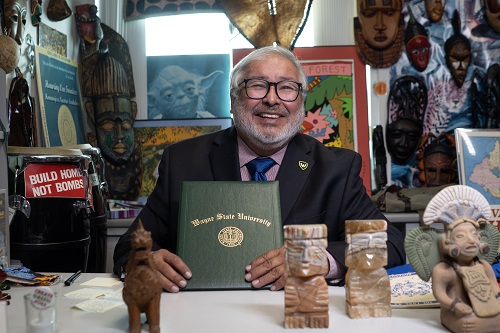Dr. José Cuello Retires After More Than 30 Years of Service to Wayne State University and CLLAS
By: Josue J. Salas

In 2021 we celebrate the Center for Latino/a and Latin American Studies (CLLAS) 50th anniversary and Dr. Jośe Cuello's inspirational and influential career as an academic, scholar, and community leader. After 38 years of working in higher education as a scholar, 1983-2021, and serving as the Center's director from 1989-2001, Dr. Cuello has decided to retire from his tenured teaching position at Wayne State to dedicate more time into his research projects and activism work. His retirement is effective August 2021.
When Dr. Cuello arrived at Wayne State University (WSU) and CLLAS in 1989, he had to balance the laborious duties of a being a tenured professor and CLLAS director. However, his first objective as director was relatively straightforward: listen to what the community wants. The community made it clear that what they wanted was a "pipeline," meaning a CLLAS program that would help address and resolve Wayne State's low Latino enrollment and retention rates. According to Dr. Cuello, as a result of his activist work, he understood that if he and the CLLAS team wanted to establish a solid and stable pipeline, they needed to institutionalize the CLLAS program. This included going above and beyond the expectations that are normally placed on an academic program director and staff, as Dr. Cuello and the team did not want the Center only to be an academic institution servicing the needs of fully enrolled WSU students, but a community institution as well.
Under Dr. Cuello's direction, the structure of CLLAS's acclaimed program came to fruition. CLLAS is an innovative academic program that provides in-house student services such as recruitment, academic advising, financial aid, and peer mentorship, further establishing a sense of community among CLLAS's diverse body of students. Dr. Cuello's objective was not only higher enrollment rates but higher retention rates as well. While Dr. Cuello had a massive part in laying the foundation for CLLAS, he gives high praise to current CLLAS director, Dr. Jorge Chinea, current assistant director, Melissa Morse, and current academic advisor Tamara Serrano, for further improving CLLAS’s services, and adapting CLLAS from a two-year program into a four-year program, adding a college to career component into the curriculum.
Throughout his 38 years in academia, Dr. Cuello has received multiple awards and honors, such as the National Endowment for the Humanities Fellowship (1988-1989), WSU President's Award for Excellence in Teaching (2006), and WSU Humanities Center Resident Scholar (2018-2021). Most recently, he earned Emeritus status in the WSU Department of History and a Presidential Citation Award for outstanding service to the university and community. The citation was presented at the CLLAS 50th Anniversary Celebración.
Dr. Cuello comments that his retirement from his tenured Wayne State position entails that he no longer will be paid by Wayne State to teach and conduct research. However, he states that his academic and activist work is far from over. He plans on dedicating time and effort into advocating for Wayne State and CLLAS to be "green" institutions, or institutions determined on addressing and resolving ecological and climate issues.
Dr. Cuello also has two written projects, working title: Cosmic War in the Desert: The Ideological Conflict Between Western Civilization and the Nomadic Nations of Northern Mexico, 1540-1750, a piece that "challenges the colonizing paradigm that dominates the modern historiography of colonial Mexico," by providing further insight into the practices of Aridamerica's nomadic bands which allowed them to construct a complex social organization based on the Principal of Reciprocity that governed human social relations and human relations with Nature. And working title: Human Imperatives, Earthly Consequences: A Unified Theory of the Rise and Fall of Civilizations, a piece which "explains how our species created a global ecological crisis." According to Dr. Cuello, this ambitious piece details how humans build and destroy civilizations and what can be done to nurture the environment, and as a result, save humanity.
Thank you, Dr. Cuello, for everything you have given the Center, its students, and the community.